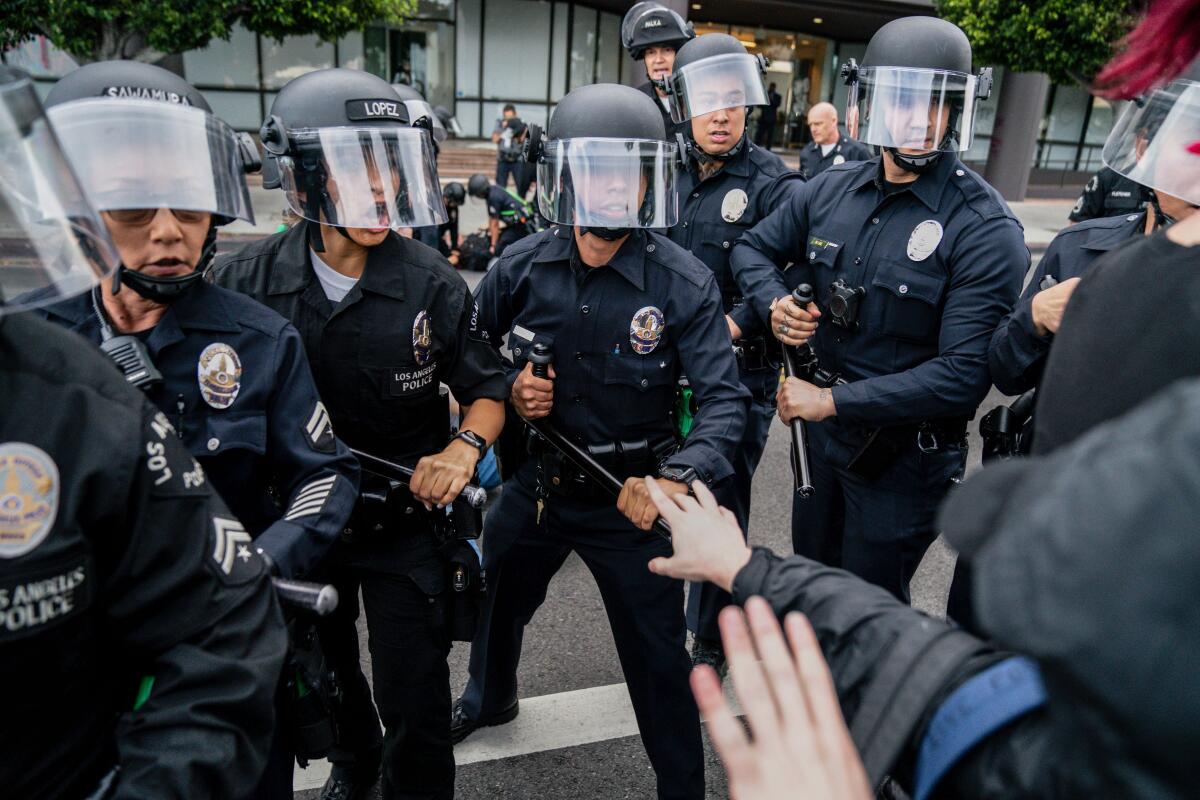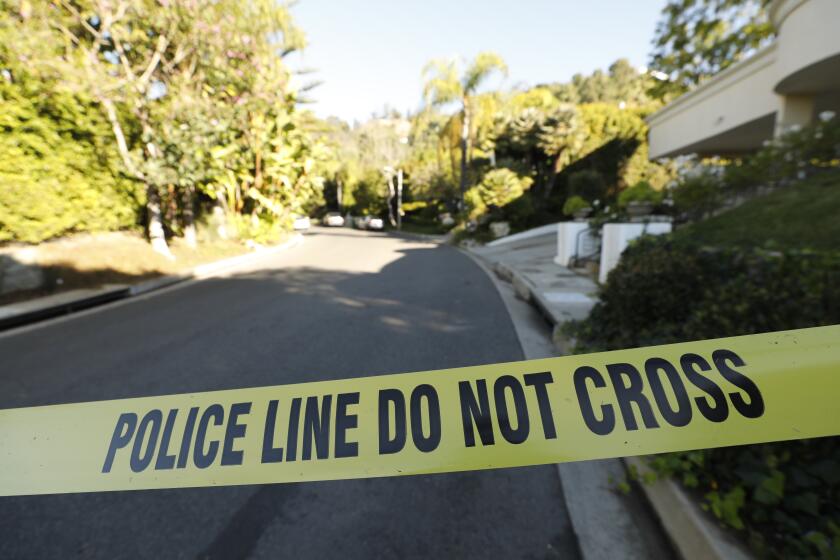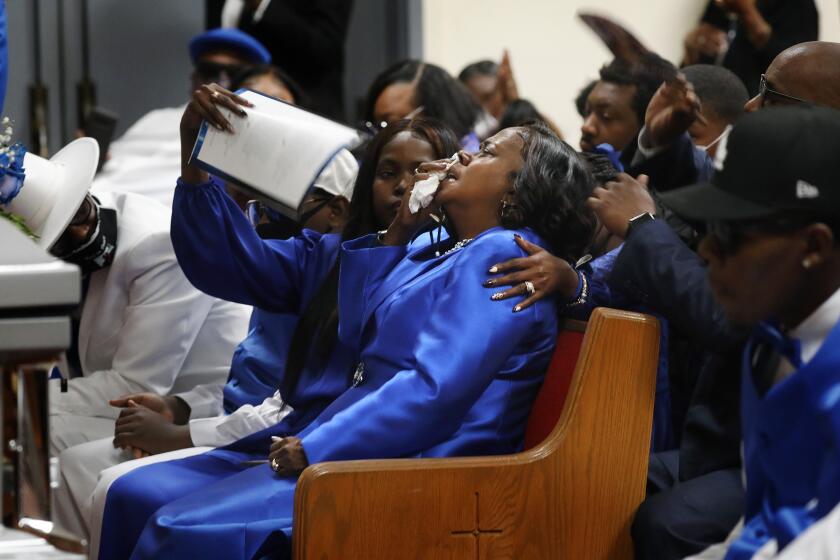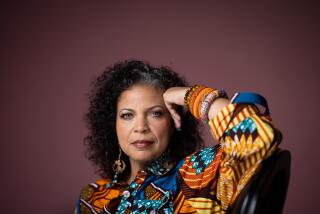Tough-on-crime politics are back in California. But Black activists aren’t giving up

- Share via
“I don’t think all is lost.”
I’m not sure what I expected to hear when I called up Cat Brooks, co-founder of Oakland’s Anti Police-Terror Project, but it sure wasn’t that.
Like her, I’ve been watching with growing unease as supposedly progressive politicians have returned to the kneejerk, tough-on-crime policies and rhetoric of California’s past, swearing it’s the only way to slow a string of brazen robberies and homicides.
On Friday, Gov. Gavin Newsom announced a proposal to secure hundreds of millions of dollars in grants to crack down on organized retail theft and help local law enforcement catch and prosecute accused criminals.
“There should be consequences. Laws are laws,” he said, adding: “You break a window, you smash and grab, you take other people’s property that’s wrong, period, full stop. [There’s] no justification for that, in any way, shape or form.”
His words echoed those of Los Angeles Mayor Eric Garcetti, who in addition to talking about the need for more cops, criticized the zero-bail policies that were implemented because of the COVID-19 pandemic, saying that “there are people who need to be behind bars.”
Meanwhile, in San Francisco this week, Mayor London Breed called a news conference to make a show of wanting to flood the long-troubled Tenderloin district with cops. On Friday, she declared a state of emergency.
“It’s time the reign of criminals who are destroying our city ... come[s] to an end,” Breed said. “And it comes to an end when we take the steps to be more aggressive with law enforcement. More aggressive with the changes in our policies, and less tolerant of all the bull— that has destroyed our city!”
Notably, the crackdown will include targeting people who are not only selling drugs, but using them. Because criminalizing addiction has always worked so well.
Politicians pushing for tougher-on-crime policies might be tempted to cite the philanthropist’s death. But she should be remembered for her life.
And not to be left out, Oakland Mayor Libby Schaaf has asked Newsom to send in the California Highway Patrol. She also wants to install Big Brother-style license plate readers along freeways because people who commit crimes often use stolen vehicles.
“Such technology can multiply law enforcement efforts in a focused, intelligence-based manner, while still balancing the important privacy interests of the community,” Schaaf wrote Newsom.
This is on top of the Oakland City Council’s decision to add two police academies, in hopes of recruiting officers to a department that’s the smallest it has been in a decade.
At all of this, Brooks is outraged and disappointed, but not surprised.
“We knew that dead Black bodies were very soon not going to be the ‘it’ thing to rally around,” she told me. “White people are going to go back to business as usual. So we need to brace ourselves for that.”
The question is what comes next.
::
For months after George Floyd was murdered by police in Minneapolis in May 2020, Brooks and other activists had many Americans convinced that law enforcement agencies were utterly broken, steeped in racism and in dire need of reform. The calls to invest in Black communities and right the wrongs of systemic racism were at an all-time high.
In fact, a year ago this month, I published a column about the widespread embrace of Black Lives Matter. “Turning a moment into a movement is hard,” I wrote, “but not half as hard as sustaining it.”
Case in point: A recent poll from Pew Research Center found that new concerns over crime have led to a spike in the number of Americans who want to redirect money to law enforcement in their cities.
Brooks understood this would happen more than most people.
Known for her activism after the 2009 shooting of Oscar Grant by a BART police officer, she watched public and political opinion shift up close. What’s happening now is no different.
“Organizers around the country are scurrying to try to figure out what of our gains can we keep,” Brooks said. “Where did we miss the mark? What were we not prepared for?”
Industry groups and politicians are sounding alarms over the thefts. But in some cases, the statistics they cite are inflated or flat-out wrong.
For Melina Abdullah, co-founder of the Black Lives Matter chapter in L.A. and director of Black Lives Matter Grassroots, it’s the rhetoric that’s being used to trash progressives and criminal justice reform.
Activists, she said, must push back on the slippery slope that links efforts to “defund the police” (which didn’t happen in most cities) to rising violent crime (which is happening in most cities), therefore justifying the need for more police officers on the streets.
As an example, Abdullah pointed to the widely reported comments by Jamie McBride, a board member with the Los Angeles Police Protective League and a veteran LAPD detective who racked up a disproportionate number of on-duty shootings.
He told “Fox & Friends First” that tourists shouldn’t come to L.A. during the holidays. “We can’t guarantee your safety,” McBride insisted. “It is really, really out of control.”
Never mind that the numbers on actual crime indicate no such thing.
There’s also the conflating of homicides, such as the shooting of Beverly Hills philanthropist Jacqueline Avant, with the string of clearly organized, “smash and grab” robberies at luxury stores.
“The idea that we should all be scared to shop for the holidays because robbers might come and get us is just an absolutely ridiculous narrative,” Abdullah said.
But beyond the rhetoric is the task of changing actual policies. Newsom tried to walk a fine line about this on Friday, calling the debate between reforming the criminal justice system and cracking down on violent crime a “lazy” debate.
“The solution to all these problems is not just a law enforcement only approach. But we would be naive to suggest it excludes law enforcement,” he said. “And so it’s both.”
He also added that despite the tough-on-crime rhetoric coming from his own mouth, California isn’t “walking back on our commitment in this state to advance comprehensive reforms” or to “right the wrongs of the past.”
Still if, as polls show, most Americans — even Black Americans — don’t want to “defund the police,” or ease up on prosecuting criminals, that presents larger problems.
“We have to win the souls of our people and we have to earn that,” Brooks said.
That means understanding and acknowledging why, even in Black communities, many people really do want more police. Blame the very real uptick in violent crime there.
Compton Pastor Joe Reginald Moore Sr. had just ended Bible study when he was killed in broad daylight. It’s the latest in a surge of deadly shootings.
“They’re begging for more cops because that’s what we’re all told is the only way to get safe. And it’s a cognitive dissonance for Black folks,” Brooks explained. “The more cops you have, the more encounters our communities have with law enforcement, the more violent encounters there are.”
Brooks said she takes off her jewelry before she gets gas now. Abdullah told me there have been gun threats at her children’s schools.
“The conditions are real out here now,” Brooks said. “Now, what generated those conditions, though, was not some great mass explosion of Black people being savages. What happened was we had a pandemic.”
People lost their homes, their jobs, and their family and friends to COVID-19, not to mention their mental health. Many were pushed into the underground economy to make ends meet, which often results in an uptick a crime.
“It’s this gaslighting cycle. The state creates the conditions of poverty, which puts people in the underground economy, and then they respond to that crisis with violence in the form of policing,” Brooks said. “We’re in that cycle.”
Explaining that will be the top challenge for Black activists in 2022 and could determine the future of the movement.
“We’ve clearly lost the communications war,” Brooks told me. “But I do think that we are at a crisis point where we have to course-correct, shift strategy, use data and facts to beat back the lies that are being told about us.”
More to Read
Sign up for Essential California
The most important California stories and recommendations in your inbox every morning.
You may occasionally receive promotional content from the Los Angeles Times.

















